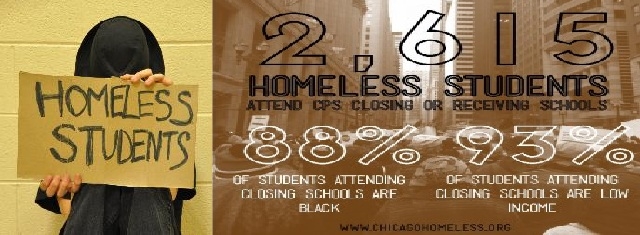Health
AMERICAN HOMELESS STUDENTS NUMBER INCREASES SINCE 2008 RECESSION
DATA SHOWS TWICE MORE THAN BEFORE 2008

(Source: Wikipedia - Chicago Coalition for the Homless)
USPA NEWS -
The number of homeless children attending public schools in the United States has doubled since before the 2008 recession, reaching a record national total of 1,360,747 million in 2013-2014 school year, according to new Federal statistic released on Monay september 14...
The number of homeless children attending public schools in the United States has doubled since before the 2008 recession, reaching a record national total of 1,360,747 million in 2013-2014 school year, according to new Federal statistic released on Monay september 14.
The Highest Levels are :
- California = 310,002
- New York = 145,259
- Texas = 111,759
- Florida = 71,244
“¦
The Highest Levels are :
- California = 310,002
- New York = 145,259
- Texas = 111,759
- Florida = 71,244
“¦
The Lowest Levels are :
- South Dakota = 1,926
- Wyoming = 1,457
- Vermont = 1,145
- Rhode Island = 1,020
The impact is profound on public schools, which struggle to try to address the needs of homeless children. Teachers often find themselves working not only to help children learn but also to clothe them, keep them clean and counsel through problems, that interfere with classroom progress.
- South Dakota = 1,926
- Wyoming = 1,457
- Vermont = 1,145
- Rhode Island = 1,020
The impact is profound on public schools, which struggle to try to address the needs of homeless children. Teachers often find themselves working not only to help children learn but also to clothe them, keep them clean and counsel through problems, that interfere with classroom progress.
Nationwide, student homelessness has increased steadily since 2009. Now, nearly 3% of the nation's public school students are homeless. Barbara Duffield, Director of policy and programs at the National Association for the Education of Homeless Children and Youth, said she thinks the rise could be driven in part by the economy but also by schools getting better at identifying and counting homeless children.
Homeless children are more likely to be diagnosed with learning disabilities, are more likely to miss schools and change schools, to drop out of school more than other children and score lower on standardized tests. It is not just urban schools that grapple with homelesses, the problem extends to rural and suburban communities.
Homeless children are more likely to be diagnosed with learning disabilities, are more likely to miss schools and change schools, to drop out of school more than other children and score lower on standardized tests. It is not just urban schools that grapple with homelesses, the problem extends to rural and suburban communities.
Liability for this article lies with the author, who also holds the copyright. Editorial content from USPA may be quoted on other websites as long as the quote comprises no more than 5% of the entire text, is marked as such and the source is named (via hyperlink).






